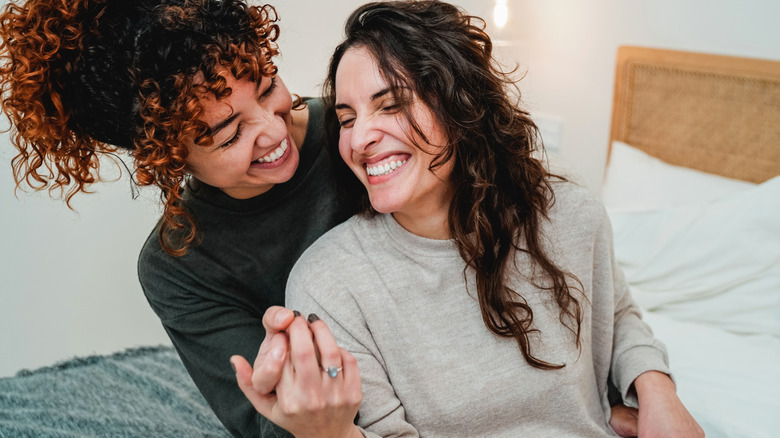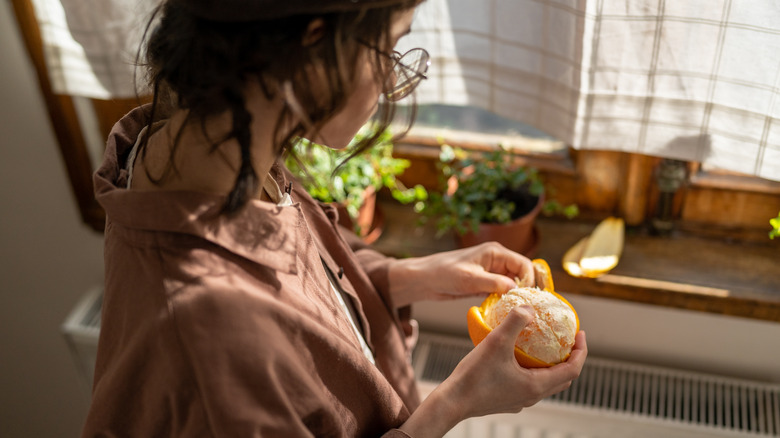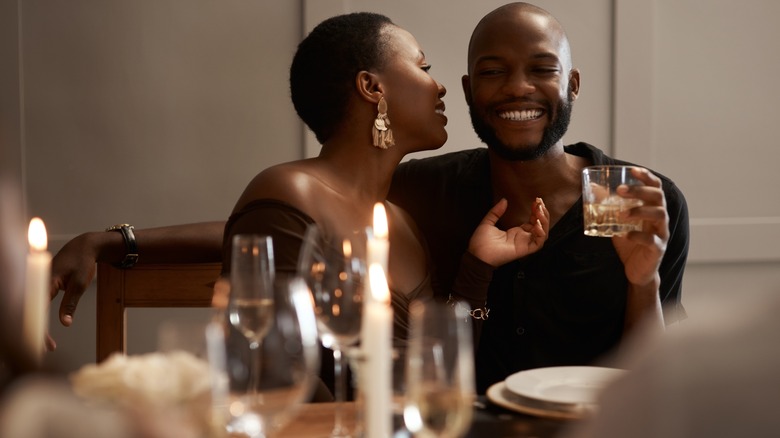The Orange Peel Theory: The Viral TikTok Concept That Could Save Your Relationship
When it comes to relationships, especially determining if they will last, people turn to some interesting predictors. Some use Dr. Elizabeth Trattner's jelly bean test to determine if their partner is willing to make sacrifices when necessary, while others rely on the bird theory to reveal whether a relationship has what it takes for the long haul. Even those who aren't suspicious or concerned about the life of their relationship sometimes need a quirky outside source to give them peace of mind.
The latest unconventional predictor of relationships is the "orange peel theory." In recent days, thanks to TikToker @neanotmia, this theory has not only garnered over 33 million searches on the social media platform, but has gone viral. As @neanotmia explains in the video, "As I understand it, the orange peel theory is pretty much how it sounds. You may really enjoy eating an orange, but some people find peeling the orange to be an unpleasant task ... It might not literally be about peeling the orange, [but] more so, they're asking you for a small favor to see your reaction to see if later they can ask you for bigger favors." In other words, it's sort of a twist (pun!) on the love language acts of service.
Although this theory is currently making the rounds among thousands, if not millions of relationships, the real question is if it holds enough water to be a valid relationship predictor. It's a fun concept, like many things we see on TikTok, but can it really save your relationship? Depends on how badly you need your orange peeled.
What the orange peel theory really is
As TikToker @neanotmia pointed out, the orange peel theory represents far more than just the peeling of an orange. When your partner steps in to do something you don't want to do as a means to make things easier for you or to lighten the load, it speaks volumes as to how much they care for you. It is, without a doubt, a perfect example of acts of service, one of the five love languages based on Gary Chapman's theory. "An act of service is about dedicated time and effort, usually in a nonverbal way," holistic therapist Medina Colaku, M.A., LAc told Mind Body Green. "It is quite literally showing up in ways that are tangible, meaning actions speak louder than words."
What's interesting about the orange peel theory is that even those who don't necessarily subscribe to Chapman's theory of love languages or identify theirs as being acts of service, are using it as a standard in their own relationships. For example, TikToker @jennaskates, who's a baker, posted a video showing that her partner had separated the whites of eggs from dozens of yolks to make her job easier. She'd casually mentioned the night before that the task was difficult for her to do because of her long nails, so he stepped up, surprising her in the process. Essentially, Jenna's BF had peeled her orange, showing her just how much he values her and respects her time.
What it says about your relationship
More than anything, the orange peel theory shows that our partners are listening to us and seeing us. It's an act of kindness that creates a connection and the ultimate testament to "actions speak louder than words." We can say all what we want to our partners — praise them, compliment them, verbally support them, but it's our behavior that's the true measure of our feelings. Even telling our partners we love them doesn't have much weight without actions.
"Saying 'I love you' on a regular basis is not always indicative of relationship status," psychologist Jeremy Nicholson told Mic. "A better indicator is how the partners actually treat and care for each other. Without loving behaviors backing it up, saying 'I love you' is just an empty expression." As Nicholson also pointed out, saying things like "I love you" sometimes become habits that can lose their meaning fast. Actions, even done over and over again — the daily peeling of an orange as an abstract idea — never lose their meaning because it's dependent upon time and effort. It's a self-sacrifice that's being made by one partner to offer relief and support to the other partner.
Is it worthwhile?
While the orange peel theory can be a great conversation starter about wants and needs in a relationship, it shouldn't be the only thing that determines the strength and health of a relationship. Love and relationships aren't so reductive and it's insulting to treat them as if they are. Relationships are also a matter of realistic expectations and deciding what you can live without if necessary.
"I think when we look to partners to mind read, we're getting down a slippery slope of interdependence," licensed clinical social worker and certified sexuality educator Rebecca Coopersmith told Today about the orange peel theory. "It's important for each person to understand for themselves why they think that's such a big deal in their relationship ... [and] consider all the details: the good and the bad." As Coopersmith explained, someone may have a great relationship but jeopardize it by holding the orange peel theory to an unhealthy standard. "I think it's dangerous for anything, if you just look at a small detail without looking at the big picture."
In our life, we will meet lots of people. Some will need their oranges peeled and some will be peelers of those oranges. It's a very basic give-and-take that comes with all relationships. But relationships are far more than one thing. If your partner doesn't peel your orange, ask yourself what they bring to the relationship instead. Some people are bad peelers, while others simply aren't a fan of sticky fingers — facts that should be considered before throwing in the towel. After all, these are probably the reasons you don't want to peel the orange yourself.



